If you’ve noticed your bearded dragon’s poop turning green, don’t panic—it’s a pretty common thing! As a loving reptile owner, it’s normal to feel concerned when something looks off.
Green poop in your bearded dragon often comes from diet, stress, or illness. It may also signal liver problems, parasites, or anemia. Monitor behavior and consult a reptile vet if it continues.
In this guide, we’ll explore why your bearded dragon’s poop might be green, what it means, and what you can do about it. With the proper care and a little know-how, you can keep your scaly friend happy, healthy, and pooping just the way they should!
Bearded dragons love leafy greens, such as kale, collard greens, and dandelion leaves. These veggies are nutritious but can tint their poop green due to natural pigments.
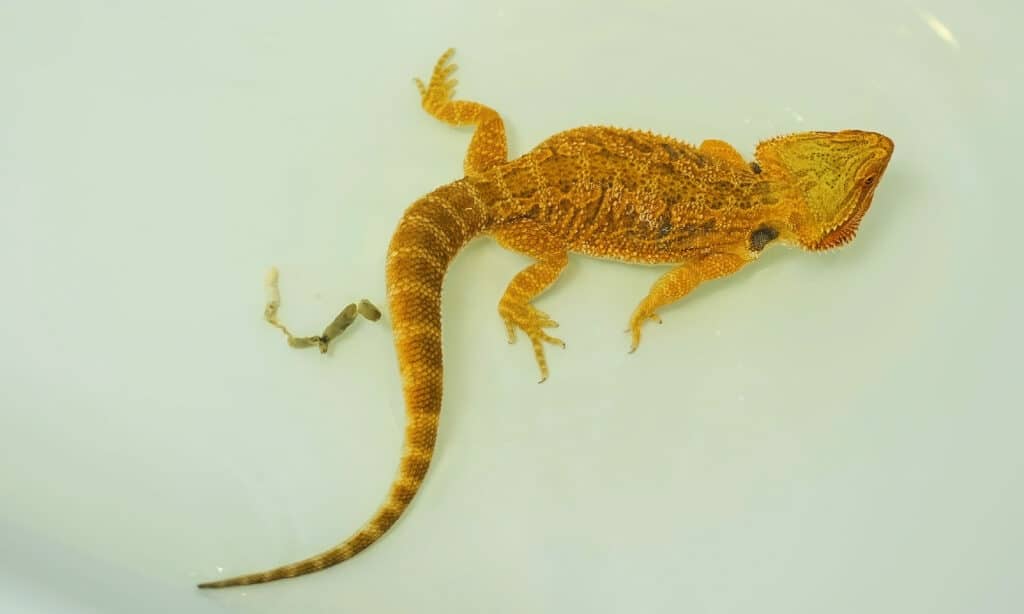
This color change is typically normal and not a cause for concern. However, it’s crucial to offer a variety of vegetables to ensure a balanced intake of nutrients. If your dragon’s behavior remains normal, green poop from greens is usually nothing to worry about.
Some commercial bearded dragon foods and supplements contain artificial colors. When your dragon consumes these, it can lead to green-colored poop. This is generally harmless.
However, it’s advisable to feed pellets in moderation and ensure they are moistened before serving. Dry pellets can be hard to digest and might cause dehydration. Always observe your dragon’s overall health and consult a vet if you notice any unusual changes.
Bearded dragons can get too much water, especially if they eat a lot of watery foods like cucumbers, fruits, or hornworms. This overhydration can lead to runny, greenish poop.
While hydration is essential, excessive water intake can upset their digestive system. Ensure your dragon’s diet is balanced, offering a mix of vegetables and insects, and limit high-water-content foods.
Always provide fresh water in a shallow dish, but avoid over-misting or force-feeding water. If you notice consistently runny or green poop, it might be time to adjust your diet and consult a vet.
Stress can significantly impact your bearded dragon’s health, leading to changes such as green or runny feces. Common stressors include a new environment, excessive handling, loud noises, or changes in their habitat.
Signs of stress might include glassy eyes, loss of appetite, or dark stress marks on their body. To help your dragon, ensure their enclosure is set up correctly with appropriate temperatures, hiding spots, and minimal disturbances.
Regular routines and gentle handling can also reduce stress. If stress symptoms persist, it’s advisable to consult a reptile veterinarian.
Parasites like pinworms or coccidia are common in bearded dragons and can cause green, smelly, or runny poop. Other symptoms might include weight loss, lethargy, or decreased appetite.
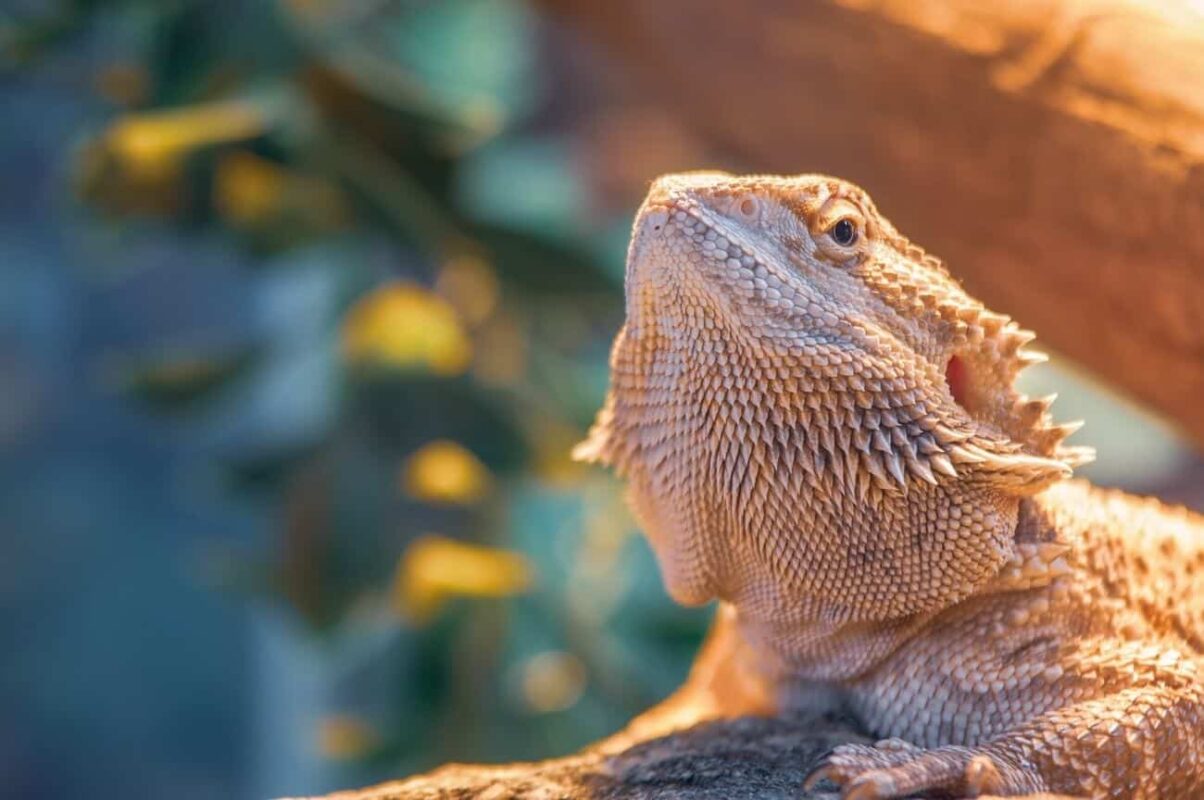
These parasites can be contracted from contaminated food, water, or unsanitary living conditions. Regular fecal exams performed by a veterinarian are essential for detecting and treating parasitic infections early.
Maintaining a clean habitat, providing fresh food and water, and practicing good hygiene can help prevent these infections. If you suspect your dragon has parasites, seek veterinary care promptly.
Bacterial infections can disrupt your bearded dragon’s digestive system, leading to green, foul-smelling, or runny feces. These infections often result from poor husbandry practices, such as unclean enclosures, contaminated food, or inadequate environmental temperatures.
Symptoms may also include lethargy, loss of appetite, or visible signs of illness. Prompt veterinary attention is crucial, as untreated bacterial infections can be severe and potentially life-threatening.
Treatment typically involves antibiotics and improving habitat conditions. Regular cleaning, proper diet, and appropriate environmental settings are key to preventing bacterial infections in your bearded dragon.
Sometimes, medications prescribed to treat parasites or infections in bearded dragons can cause side effects like green or runny poop.
This happens as the medicine affects their digestive system or as parasites are expelled. Common side effects include temporary loss of appetite, diarrhea, or lethargy.
It’s essential to monitor your dragon during treatment. Ensure they stay hydrated and maintain a comfortable environment. If unusual symptoms persist or worsen, consult your veterinarian promptly to adjust the treatment or address any concerns.
Bearded dragons may accidentally eat loose substrates like sand or wood chips while feeding, leading to green poop or digestive issues. Ingesting these materials can cause impaction, a serious condition in which the digestive tract becomes blocked.
Signs include lack of appetite, lethargy, or difficulty moving. To prevent this, use safe substrates like reptile carpet, tile, or paper towels in their enclosure.
Always supervise feeding and ensure their habitat is clean and well-maintained. If you suspect your dragon has ingested substrate and shows symptoms, seek veterinary care immediately.
Green poop in bearded dragons can sometimes indicate liver or bile problems. Conditions like hepatic lipidosis (fatty liver disease) can alter the color and consistency of feces. Other signs include lethargy, weight loss, or jaundice (yellowing of the skin).
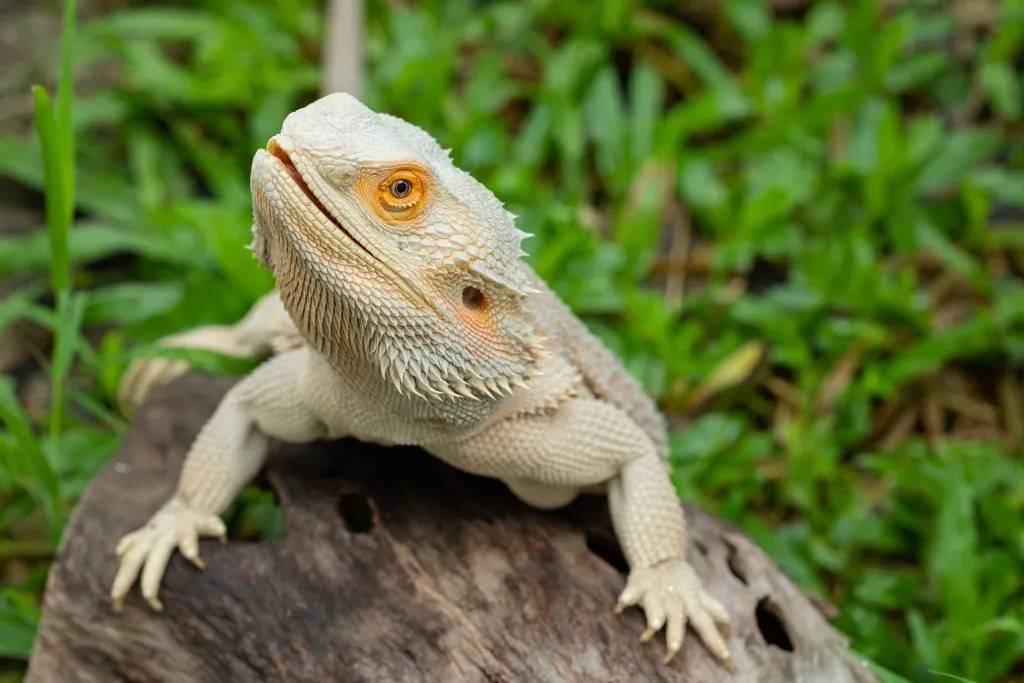
These issues often result from a poor diet, obesity, or inadequate lighting. Regular veterinary check-ups, a balanced diet, and suitable UVB lighting are essential for maintaining liver health.
If you notice persistent green stool along with other symptoms, consult your veterinarian for a proper diagnosis and treatment.
| Color | Possible Cause | Action |
| Green | Diet, stress, infection | Monitor; consult vet if persistent |
| Brown | Normal | No action needed |
| Black | High protein diet, bleeding | Consult vet |
| Yellow | Liver issues, excess calcium | Consult vet |
| Red | Blood, red foods | Monitor; consult vet if unsure |
Seek veterinary attention if:
- Green poop persists beyond a few days
- Accompanied by lethargy or loss of appetite
- Presence of blood or mucus in feces
- Unusual odors or consistency changes
Regular check-ups and prompt attention to changes can ensure your bearded dragon remains healthy and happy.
If your bearded dragon’s poop is green but they’re acting normal, it might be due to their diet, especially if they’ve eaten a lot of leafy greens.
This is usually harmless. However, if the green color persists or is accompanied by other symptoms, consult a reptile veterinarian.
Green poop after a diet change, stress, or medication is common in bearded dragons. Their digestive system may be adjusting.
Monitor their behavior and appetite. If the green stool continues for several days or other symptoms appear, it’s best to consult a reptile veterinarian.
A healthy bearded dragon’s feces is typically brown with a white urine deposit. Green stool can result from a change in diet or stress.
Yellow may indicate excess calcium. Red or black could signal blood. The runny stool might suggest parasites or overhydration. Consistent abnormalities warrant a vet visit.
Unhealthy stool may be runny, discolored, or have a foul odor. Signs include green, yellow, red, or black stools or the presence of mucus.
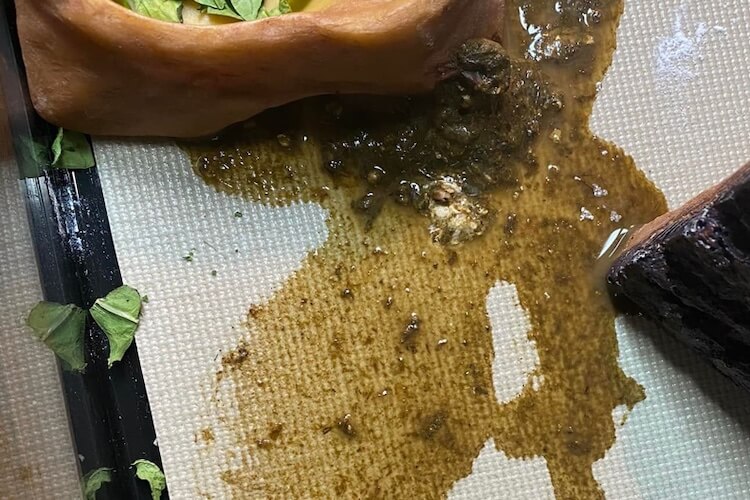
These can indicate dietary issues, infections, or parasites. If such symptoms persist, consult a reptile veterinarian promptly.
Runny stool can result from overhydration, dietary changes, stress, or parasitic infections. Occasional loose stools aren’t uncommon, but persistent diarrhea requires attention. Ensure proper diet and habitat conditions. If the issue continues, seek veterinary advice.
If your bearded dragon is constipated, try a warm bath for 20–30 minutes to stimulate bowel movements. Gently massage their belly while they are soaking.
Ensure they have proper hydration, a balanced diet, and optimal basking temperatures. If constipation persists, consult a reptile veterinarian.
Promptly remove poop using paper towels. Clean the area with a reptile-safe disinfectant or a vinegar-water solution.
Rinse thoroughly and dry before returning your dragon. Regular cleaning prevents bacteria buildup and maintains a healthy environment.
Green, runny poop in bearded dragons can result from dietary changes, overhydration, stress, or parasites. If it’s occasional and your dragon behaves normally, it’s likely not serious.
However, persistent symptoms or additional signs, such as lethargy or loss of appetite, warrant a vet visit to rule out infections or parasites.
Pooping frequency varies with age and diet. Babies may poop daily due to high protein intake. Juveniles might go every other day, while adults can poop once a week or even less.
Consistency is key; sudden changes in frequency or stool appearance should be discussed with a veterinarian specializing in reptiles.
Diarrhea in bearded dragons can stem from stress, dietary issues, parasites, or infections. Loose, watery stool, especially if foul-smelling, indicates a problem.
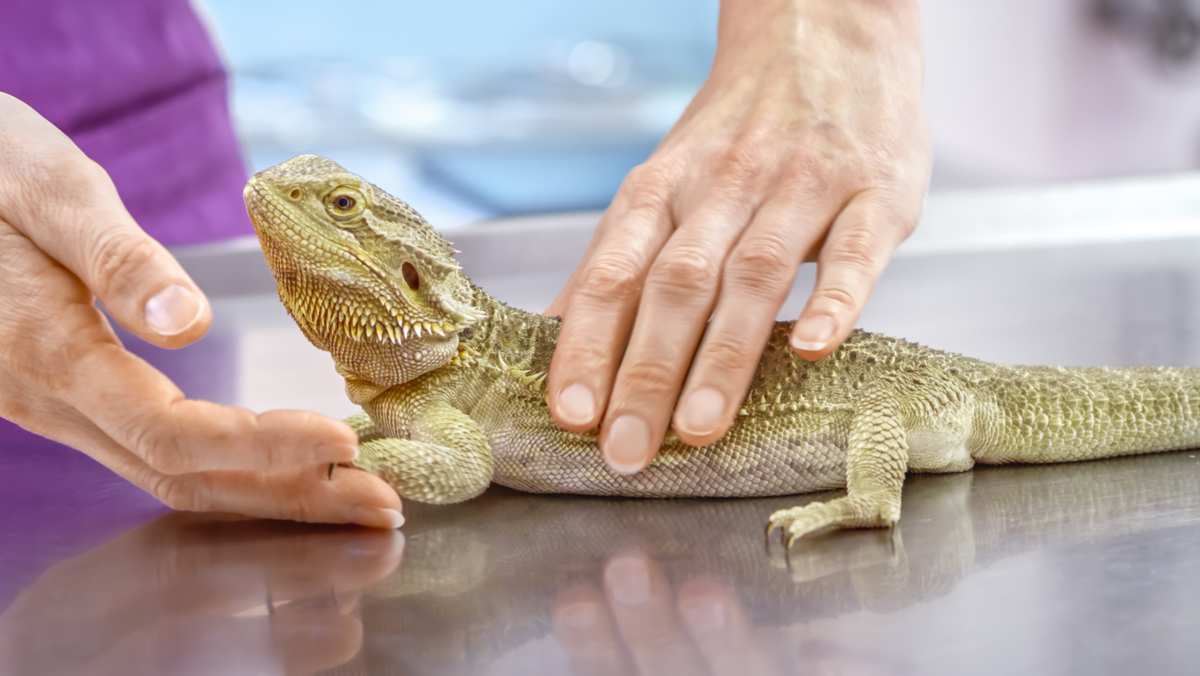
Ensure proper diet and habitat conditions. If diarrhea persists or is accompanied by other symptoms, consult a reptile veterinarian for diagnosis and treatment.
Bearded dragons can contract parasites through contaminated food, water, or environments. Common culprits include pinworms and coccidia.
Stress and poor husbandry can exacerbate infestations. Regular cleaning, proper diet, and routine vet check-ups help prevent and detect parasites early, ensuring your dragon stays healthy.
No, collard greens are excellent for bearded dragons. They’re nutritious and can be fed daily as part of a balanced diet.
Unhealthy poop may be runny, discolored (green, yellow, or red), or have a foul odor. Such changes can indicate dietary issues or illness.
Signs include sunken eyes, wrinkled skin, lethargy, and thick saliva. Regular baths and hydration help prevent dehydration.
Stress signs include dark stress marks, glass surfing, loss of appetite, and hiding. Ensure a calm environment to reduce stress.
Yes, lizard poop can be green, especially if they consume a plant-rich diet. Chlorophyll in plants affects feces color.
Collard greens are among the healthiest and rich in calcium and vitamins. They can be fed daily to bearded dragons.
Bearded dragons can eat lettuce occasionally, but it’s low in nutrients and high in water, which may cause diarrhea.
Yes, bearded dragons should eat greens daily. Staple greens, such as collard, mustard, and turnip greens, provide essential nutrients.
Carrots are safe in moderation. They provide vitamin A but should be fed occasionally due to their sugar content.
Green, watery, foul-smelling stools can result from a poor diet or stress. If the behavior is normal, monitor it closely; consult a veterinarian if it persists.
Green poop in bearded dragons is often harmless, caused by diet, stress, or hydration. However, if it persists or is accompanied by other symptoms, it may signal the presence of parasites or an underlying illness. Always monitor your dragon’s behavior and environment, and consult a reptile vet to ensure they stay healthy, happy, and well cared for.
